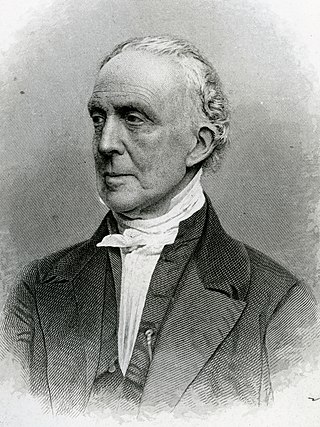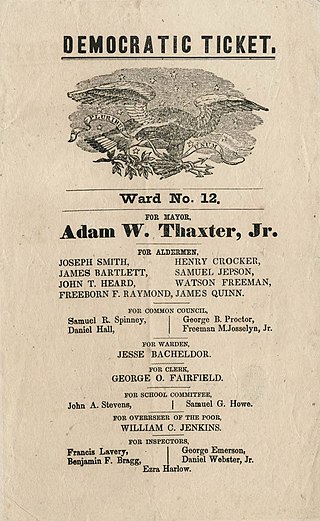
The mayor of Boston is the head of the municipal government in Boston, Massachusetts, United States. Boston has a mayor–council government. Boston's mayoral elections are nonpartisan, and elect a mayor to a four-year term; there are no term limits. The mayor's office is in Boston City Hall, in Government Center.

Josiah Quincy III was an American educator and political figure. He was a member of the U.S. House of Representatives (1805–1813), mayor of Boston (1823–1828), and President of Harvard University (1829–1845). The historic Quincy Market in downtown Boston is named in his honor. A panel of 69 scholars in 1993 ranked him among the ten best mayors in American history.

John Phillips was an American politician, serving as the first mayor of Boston, Massachusetts, from 1822 to 1823. He was the father of abolitionist Wendell Phillips.

Jonathan Chapman was an American politician who served as the eighth mayor of Boston, Massachusetts from 1840 to 1842.

Joseph Milner Wightman was an American politician who, from 1861 to 1863, served as the seventeenth Mayor of Boston, Massachusetts.

Thomas Aspinwall Davis was a silversmith and businessman who served as mayor of Boston for nine months in 1845.
The Boston mayoral election of 1854 saw the reelection of incumbent mayor Jerome V. C. Smith. It was held on December 11, 1854.
The Boston mayoral election of 1855 saw the election of Alexander H. Rice. It was held on December 10, 1855.
The Boston mayoral election of 1865 saw Frederic W. Lincoln Jr. reelected to a seventh overall term.
The Boston mayoral election of 1866 saw the election of Republican Party nominee Otis Norcross.
The Boston mayoral election of 1868 saw the reelection of Nathaniel B. Shurtleff.
The Boston mayoral election of 1871 saw the reelection of incumbent Democrat William Gaston, who defeated Republican nominee Newton Talbot.
The Boston mayoral election of 1873 saw the election of Samuel C. Cobb.

The Boston City Charter is a series of State statutes which codifies a system of rules for the government of the City of Boston, Massachusetts. The Charter is not a typical city constitution but rather a series of amendments, General Court rulings, and case law which form the basis of government. The central organs of the Boston City Charter are the Mayoral Office and City Council. The composition of these offices, their term length, manner of election, and scope of power have changed throughout the years.
Elections are currently held every four years to elect the mayor of Springfield, Massachusetts.
The Boston mayoral election of 1853–1854 saw the election of Citizens Union Party nominee Jerome V. C. Smith. The election took three votes, as no candidate secured the needed majority in the first two attempts. Incumbent Whig mayor Benjamin Seaver had run for reelection as his party's nominee in the first vote, but opted not to compete in the second or third votes.

The 1851 Boston mayoral election saw the election of Benjamin Seaver, a former president of the Boston Common Council, as mayor of Boston. The election took three votes, as no candidate secured the needed majority in the first two attempts. In the third attempt, Seaver won the required majority by the margin of a single vote. Incumbent Whig mayor John P. Bigelow was not a nominee for reelection.
The 1848 Boston mayoral election saw the election of Whig Party nominee John P. Bigelow. It was held on December 11, 1848. Incumbent Whig mayor Josiah Quincy Jr. was not a nominee for reelection.
The 1844–45 Boston mayoral election saw the election of Native American Party nominee Thomas Aspinwall Davis as mayor of Boston. The election took eight votes, as no candidate secured the needed majority in the first seven attempts. Incumbent Whig Party mayor Martin Brimmer was not a nominee reelection.
The 1831 Boston mayoral election saw the election of Charles Wells. The first vote, held on December 12, 1831, did not result in any candidate receiving the required majority of the vote, resulting in a second vote on December 22, 1831, which Wells won.











